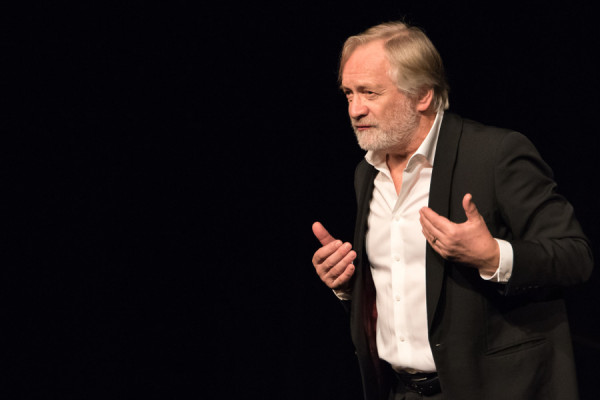Some actors are said to be loved by the camera. They shine on screen with the power of their talent and charisma, entirely captivating the audience. Some excel on the theater stage, their natural habitat. Direct contact with the audience is an important part of their craftsmanship. And then there is Andrzej Seweryn, an artist who proves to be perfect in both of these seemingly diverse types of acting.
Let us start with the theater. The protagonist of this year’s retrospective graduated from the Warsaw National Academy of Dramatic Art in 1968. After his graduation, he joined the metropolitan Ateneum Theater, where he has performed until 1980. He happened to be in Paris when martial law was declared in Poland. Remembering his experiences from 1968, when he was arrested for a few months for distributing leaflets against the Warsaw Pact’s invasion of Czechoslovakia, he decided to remain in exile. Owing to his great talent and perseverance, he achieved numerous spectacular successes. Among others, he worked with a prominent director Peter Brook, and in 1993 joined the Comédie Française troupe as the third foreigner in history. According to Daniel Olbrychski, it was as if Gérard Depardieu played such a legendary hero of the Polish literature as Gustaw-Konrad on the National Theater stage, or as if Robert De Niro recited Mickiewicz’s invocation from Pan Tadeusz—showing a perfect command of Polish, of course. In 2010, the actor came back to Poland permanently. For as much as six years, he has been the director of Polish Theater in Warsaw.
If one was to gather a pantheon of Andrzej Wajda’s actors, Andrzej Seweryn would definitely have an important place in it. It is The Promised Land for which he got greater public recognition, and his performance as Maks Baum, this “stupid and sentimental German”, as he was affectionately described by Moryc Welt, is still in great contrast with other Lodzer Mensch industrialists’ rapacity. Seweryn performed in Wajda’s films seven times afterwards. One particularly important role of his was in The Orchestra Conductor, a somewhat forgotten masterpiece of the cinema of moral anxiety, in which the actor created an ambiguous character of a musician devoured by his morbid ambition. You will have the opportunity to watch the digitally remastered version of The Orchestra Conductor at this year’s edition of Two Riversides.
As part of the retrospective, other Polish films featuring Andrzej Seweryn will be screened, including his directorial debut Who Never Lived and The Primate by Teresa Kotlarczyk, in which he played a dual role: of noble Cardinal Wyszyński and of his demonic doppelganger. The program also includes foreign films rarely shown in Poland, created by prominent directors with whom Seweryn collaborated: the French New Wave master Alain Resnais (You Ain’t Seen Nothin’ Yet) and Barlinale Silver Bear winners: Raoul Ruiz (Genealogies of a Crime) and Marco Bellocchio (The Conviction).
So far, the last chord in Andrzej Seweryn’s impressive career is the role of Zdzisław Beksiński in The Last Family. The film by Jan P. Matuszyński won dozens of awards at Polish and international festivals and was hailed as a masterpiece by numerous critics. However, the first presage of this success was a Silver Leopard awarded to Andrzej Seweryn at Locarno Festival. With his body, emotions and intellect, in accordance with the aforementioned Peter Brook’s method, the actor depicted in a faithful and moving way the character of the tragically deceased painter. Again, entirely captivating.
Bartosz Marzec
CINEMA LESSON | Andrzej Seweryn

Date
Hour
Place
04/08
12:30
THE SMALL CINEMA
DESCRIPTION






FOLLOW US